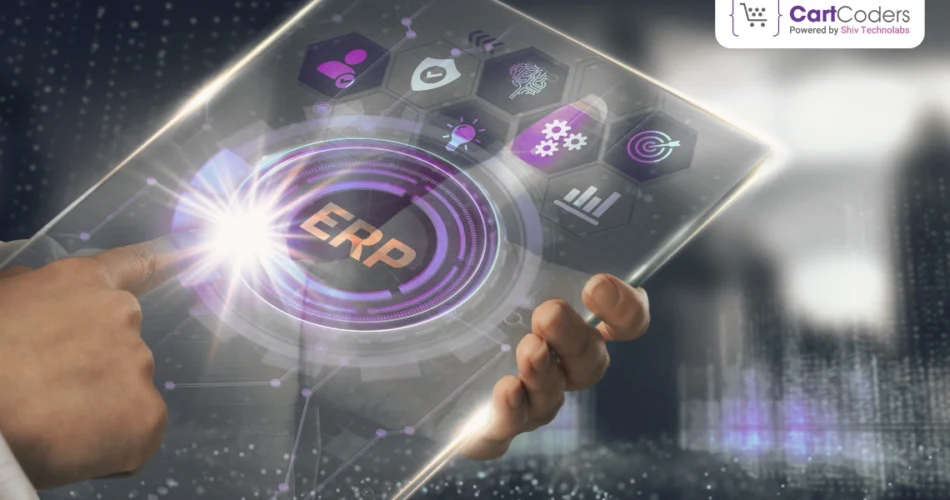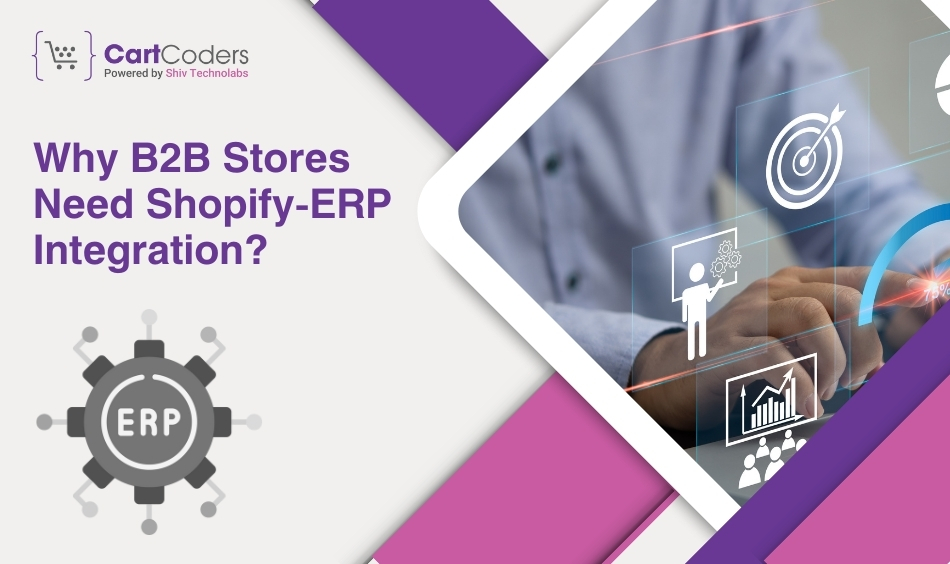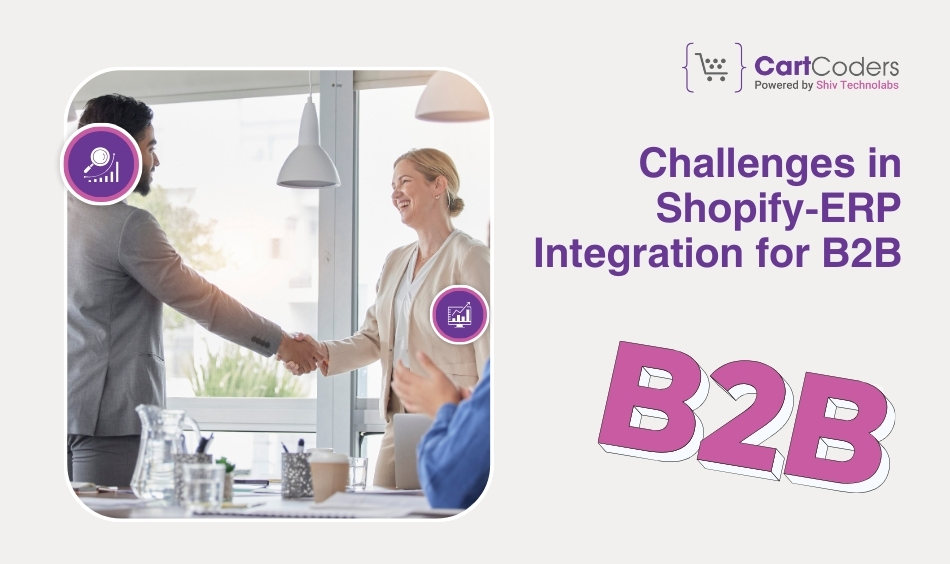Custom Engagement Solutions
Unlock tailored solutions with a free, no-obligation strategy session.
Expert Developers & Engineers on Demand
Scale Your Team with Skilled IT Professionals
Expert Guidance for Digital Transformation

B2B Stores is expanding rapidly. Shopify now ranks among the best platforms for companies that sell products to other businesses and want strong web stores. However, a B2B store brings much more work than selling straight to regular customers. Companies must handle large orders, set different prices for different buyers, and track products in many storage locations. These jobs can crush business owners who lack proper tools.
This is when Shopify ERP integration helps. Integrating Shopify with robust ERP software enables B2B sellers to automate tedious tasks, ensure data is updated in real-time, and prevent costly errors. Rather than switching between different programs for orders, stock tracking, and money management, a Shopify ERP for B2B provides a centralized platform for all information.
Simply put, ERP fills the space between what Shopify can do for B2B and the behind-the-scenes work that keeps companies running well.

Running a B2B Shopify store brings special problems. B2C sales are usually simple, but B2B work requires more advanced features and seamless integration between different systems.
B2B buyers almost never buy just one thing. They purchase a wide range of products, often with special requests. Without B2B Shopify ERP integration, handling these large orders manually is time-consuming and prone to errors. ERP automation ensures that large orders are processed smoothly through the system, with correct delivery every time.
B2B sellers usually need to show different prices to different buyers. Shopify by itself cannot do this well, but ERP integration with Shopify lets sellers set up automatic pricing rules for different customer levels and contracts. This makes sure each buyer sees their correct price right away.
Companies that keep products in several warehouses face significant challenges in keeping stock information current. A Shopify ERP solution updates product amounts across all locations, preventing overselling and ensuring buyers always see the correct availability.
When Shopify and ERP work separately, delays in updating product or stock information can create backorders and angry customers. ERP Shopify workflows ensure instant synchronization so that product listings, inventory levels and delivery dates and times always reflect the most up-to-date information.
In addition to resolving operational issues, B2B Shopify ERP integration also introduces true business improvements that enhance efficiency and profitability.
ERP Shopify connector tools handle large order processing automatically, cutting down manual work and speeding up completion time. This creates faster delivery and happier customers.
Central stock management across multiple warehouses prevents mistakes like overselling or running out of products. With Shopify ERP automation, sellers always see current stock levels.
B2B buyers want lower prices when they buy more. Shopify ERP workflows let companies set up automatic discount rules, contract prices, and custom quotes without doing manual changes.
ERP integration with Shopify makes accounting, tax compliance, and billing easier. Sellers can create accurate reports, reduce money problems, and meet local and international rules without effort.
ERP systems are not all the same. Picking the right one depends on the size of your B2B business and its specific needs. Here are the most popular ERP systems that work well with Shopify.
| ERP System | Key Strengths | Best For |
| NetSuite | Scalable, cloud-based finance | Large B2B enterprises managing global ops |
| Odoo | Modular, cost-effective | SMEs with custom Shopify ERP workflows |
| SAP Business One | Advanced reporting, compliance | Enterprises in regulated industries |
| Microsoft Dynamics | Strong CRM + ERP combination | Mid-to-large B2B organizations |

Integration comes with apparent advantages, but the process comes with complex issues that companies should be ready to address.
Moving old data into ERP systems is usually the hardest part. Wrong or mixed-up data can mess up operations if not cleaned and organized before integration.
Moving large volumes of data between Shopify and ERP can be a lengthy process, especially when one is doing it incorrectly. Good connectors help fix this problem.
B2B work often deals with private financial and contract information. Any ERP Shopify connector must follow strong compliance and data security rules to protect both the seller and the buyer.
Even the best Shopify ERP solutions fail without proper training. The system requires workers to acquire new procedures to maximize their benefits.
A considered strategy will ensure that ERP integration with Shopify is sufficient to work with B2B stores.
Start by looking at current processes and finding problems that ERP must fix, like order automation or managing multiple warehouses.
Choose an ERP based on your company size, budget, and compliance requirements.
Determine how to move data between Shopify and ERP, which includes orders, products, inventory and finance.
Before starting for real, test each workflow to find errors in syncing or process automation.
Initiate the integration with real-time monitoring and establish ongoing support to address any Shopify ERP automation issues.
ERP integration unlocks advanced Shopify B2B features, giving your business a competitive edge.
Automatically manage stock levels across multiple warehouses using central ERP Shopify workflows.
Provide customers with personal portals for tracking orders, downloading invoices, and reordering.
Save time with automatic pricing structures based on volume, contracts, or customer levels.
For global B2B stores, ERP integration supports multi-currency billing and compliance with international tax rules.
Shopify B2B sellers need more than simple tools. They need custom Shopify ERP solutions that match their workflows and grow with their business.
We focus on creating ERP integration with Shopify that fits the specific needs of B2B operations, from small distributors to big companies.
Our team has assisted global B2B sellers with more efficient bulk ordering, automated pricing settings and multi-warehouse sales via Shopify ERP processes.
From gathering requirements to watching after launch, CartCoders gives complete support to make sure your integration works smoothly.
They require it to deal with bulk operations easily and automatically, minimize manual errors, and have real-time monitoring of orders, stocks, and finance.
It depends on the business size and the complexity of its operations. Odoo is well-suited for small and medium companies, whereas NetSuite and SAP are more suitable for large companies with global operations.
Yes, top ERPs like Odoo and NetSuite offer advanced multi-warehouse management features to keep stock updated across locations.
ERP systems handle processing automatically, apply bulk discounts, and create accurate invoices for high-volume transactions.
Shopify ERP integration has become necessary for B2B sellers who want to grow efficiently while maintaining accuracy and adhering to regulations. By making workflows automatic, bringing inventory together, and enabling smarter money management, ERP integration changes a B2B Shopify store into a fully optimized business center.
As a leading Shopify development company, we help businesses get the most from Shopify ERP for B2B with custom solutions designed for growth. Whether you have trouble with bulk order management, warehouse syncing, or compliance, our team makes sure your integration brings real results. Working with CartCoders means choosing reliability, expertise, and long-term support for your B2B store.
Ready to make your operations smoother and grow smarter? CartCoders is here to build your custom Shopify ERP integration. Let’s turn your workflows into a growth engine today.
Projects delivered in 15+ industries.
95% retention rate, building lasting partnerships.
Serving clients across 25+ countries.
60+ pros | 10+ years of experience.